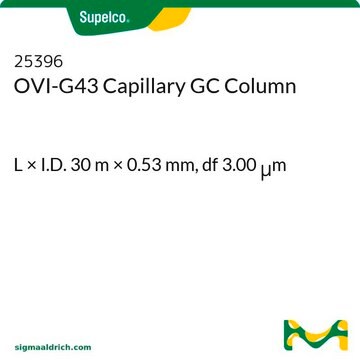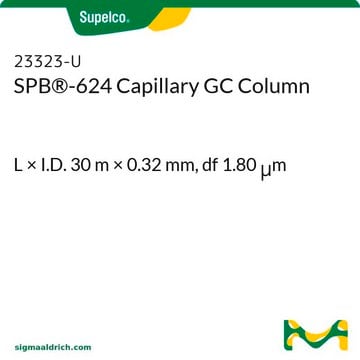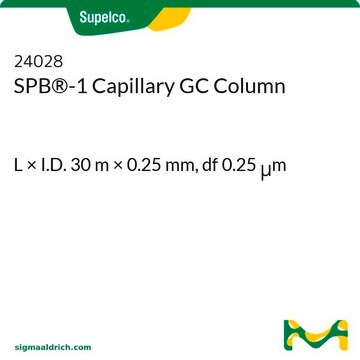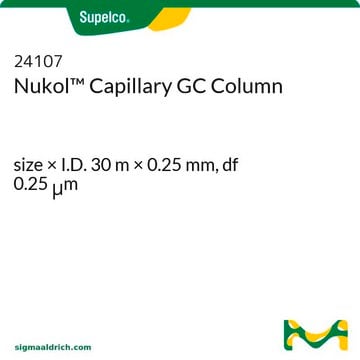24048
SPB®-5
L × I.D. 30 m × 0.32 mm, df 0.25 μm
About This Item
Produits recommandés
Matériaux
fused silica
Agence
meets requirements for USP G27 and G36
Paramètres
-60-320 °C temperature (isothermal or programmed)
Valeur bêta
320
df
0.25 μm
Technique(s)
gas chromatography (GC): suitable
L × D.I.
30 m × 0.32 mm
Groupe de la matrice active
Bonded; poly(5% diphenyl/95% dimethyl siloxane) phase
Type de colonne
capillary non-polar
Vous recherchez des produits similaires ? Visite Guide de comparaison des produits
Catégories apparentées
Description générale
USP Code: This column meets USP G27 and G36 requirements.
Phase:
- Bonded
- Poly(5% diphenyl/95% dimethyl siloxane)
- ≤0.32 mm I.D., <2 μm: -60 °C to 320 °C (isothermal or programmed)
- ≤0.32 mm I.D., ≥2 μm: -60 °C to 300 °C (isothermal or programmed)
- ≥0.53 mm I.D., <2 μm: -60 °C to 300 °C (isothermal) or 320 °C (programmed)
- ≥0.53 mm I.D., ≥2 μm: -60 °C to 260 °C (isothermal) or 280 °C (programmed)
Application
Autres remarques
Informations légales
Mentions de danger
Conseils de prudence
Classification des risques
Aquatic Chronic 2
Code de la classe de stockage
13 - Non Combustible Solids
Classe de danger pour l'eau (WGK)
WGK 2
Point d'éclair (°F)
Not applicable
Point d'éclair (°C)
Not applicable
Faites votre choix parmi les versions les plus récentes :
Déjà en possession de ce produit ?
Retrouvez la documentation relative aux produits que vous avez récemment achetés dans la Bibliothèque de documents.
Les clients ont également consulté
Chromatograms
suitable for GC, application for SPENotre équipe de scientifiques dispose d'une expérience dans tous les secteurs de la recherche, notamment en sciences de la vie, science des matériaux, synthèse chimique, chromatographie, analyse et dans de nombreux autres domaines..
Contacter notre Service technique






